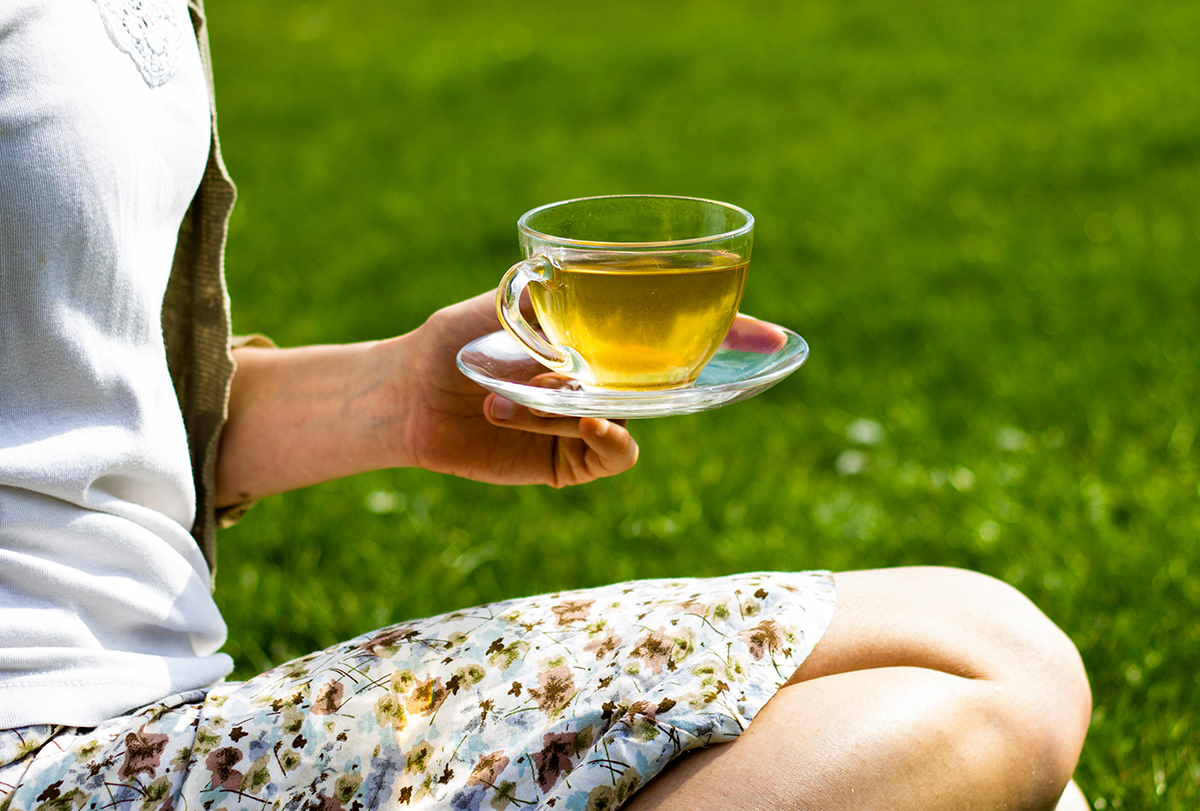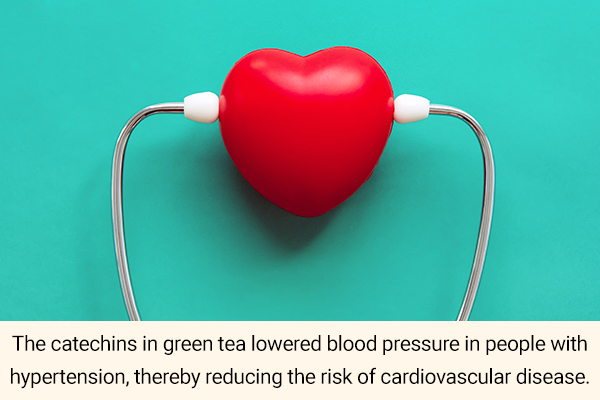In this article:
Tea is drunk worldwide since the olden days. It is not only a refreshing drink but it also functions as a detoxifying agent.

Tea is obtained from the leaves of the plant Camellia sinensis. Depending upon how the leaves are processed, tea may be classified into four categories:
- Black tea – fully fermented mature leaves
- Oolong tea – partially fermented mature leaves
- Green tea – unfermented mature leaves
- White tea – produced from immature buds (1)
Black tea constitutes about 75% of the tea produced worldwide, green tea constitutes 20%, and the rest is oolong, white, and yellow tea. (2)
In UK and USA, black tea is preferentially consumed, whereas green tea is the preferred beverage in China, Korea, and Japan. The Chinese and Taiwanese mostly consume oolong tea. (2)
Read below to know more about green tea.
Health Benefits of Green Tea
Here’s how drinking green tea can work wonders for your health.
1. Treats allergies

Allergy is an immune-mediated disease and manifests itself in different forms. Some of the allergic responses of the body include asthma and sinusitis.
Allergy is often treated with glucocorticoids and antihistamines. However, these are not considered a cure and provide only palliative relief. Hence, the search is on for natural products with anti-allergenic properties.
In recent times, green tea was found effective against asthma and food allergies due to its content of bioactive compounds such as catechins and saponins. (3)
2. Supports brain function
The human body has a very limited capacity to fight oxidative damage to the brain cells, and this results in diseases such as Alzheimer’s disease and Parkinson’s disease.
Regular consumption of green tea was observed to reduce memory impairments and prevent oxidative stress and damage, and this effect may be beneficial in the management of symptoms of Alzheimer’s and Parkinson’s diseases. (4)
3. Aids in weight management
The catechins in green tea may have a weight-reducing effect on people with obesity by increasing fat metabolism and reducing the total fat cells in the body. (5)
4. Provides antidiabetic effects
In recent times, diabetes mellitus and its complications have become an important health concern globally.
Research has shown that drinking tea could reduce the risk of diabetes mellitus and diabetic complications. Not only does green tea complement the effects of certain antidiabetic drugs, but clinical trials have shown that tea helps in the prevention and treatment of diabetes mellitus and its complications. (6)
5. Prevents cardiovascular disease

Cardiovascular disease is a major lifestyle disorder. Several studies conducted in recent times have shown that green tea intake reduces the risk of cardiovascular disease.
The catechins in green tea also lowered blood pressure in people with hypertension, thereby reducing the risk of cardiovascular disease. (7)
6. Promotes oral hygiene
Green tea catechins inhibit the growth of bacteria in the mouth and thus prevent dental caries and bad breath. (8)
7. Delays the signs of aging
Green tea as a beverage or dried powder in capsulated form can act as antioxidants that prevent damage to the skin and reduce the formation of wrinkles, thus slowing down aging. (9)
8. Fights infections
Since ancient times, green tea has been used to effectively treat different types of diarrhea and typhoid in Asia.
Green tea catechins prevent the growth of ulcer-causing bacteria in the stomach. They also inhibit the influenza virus, especially in its earliest stage, and act against the herpes simplex virus. (10)
9. Boosts immunity
Green tea has antimicrobial, anti-inflammatory, antibacterial, antifungal, and antioxidative properties, all of which help in improving immunity and preventing many diseases. (9)(11)
10. Can help prevent cancer
Many studies carried out recently have shown that green tea catechins are effective against lung, liver, breast, prostate, intestinal, pancreatic, and bladder cancers. (12)
How Do the Health Benefits of Green Tea Differ From Other Teas?
The chemical components in tea include polyphenols, flavonoids, free amino acids, and numerous flavor-rich compounds. (13)(9) The concentration of these varies with the type of processing.
Among these compounds, polyphenols are responsible for the health benefits associated with the consumption of tea. Since green tea is produced with minimal processing, it has a high content of polyphenols, making it the healthiest of the different tea types.
A particular class of polyphenols called catechins is present abundantly in green tea, and they are responsible for the health benefits associated with green tea. (11)
A large amount of research has been carried out in recent times on the health benefits of green tea and a detailed account is presented in the following sections.
How to Consume Green Tea

- Soak about 1 tsp of green tea leaves in lukewarm water for 2–3 minutes. Strain the tea through a strainer into a cup. You can consume the tea as such or add a little amount of honey to sweeten it.
- Green tea bags are also available and can be used to prepare the refreshing drink by steeping them in hot water for a few minutes.
How to Apply Green Tea to the Skin?
- Keep the used tea bags aside and allow them to dry.
- Wash and cleanse your face thoroughly.
- Mix the dried tea leaves with a little water and use them as a scrub on your face to obtain glowing, healthy skin. The antibacterial catechins in the tea will also reduce acne. (9)
Most-Asked Questions About Drinking Green Tea
Is it okay to consume green tea on an empty stomach?
Never have green tea on an empty stomach.
Strongly brewed green tea may lead to stomach upset when drunk on an empty stomach. However, very low levels of polyphenols are found in commercial preparations marketed in the United States and Asia. Hence, these are considered safe for consumption. (14)
Moreover, toxic effects are seen when people take green tea supplements containing excessive amounts of polyphenols. Take less than 500 mg a day to avoid adverse side effects.
What is the best time to drink green tea?

For best results, consume green tea every 2–3 hours.
What are the disadvantages of green tea? What is the tolerable limit?
At present, the maximum limit for green tea consumption is not known. So far, a 500 mg dose has been reported to be sufficient. (14) More research needs to be done to understand the effect of taking green tea supplements over 500 mg.
Green tea should be avoided by people with oxidative stress-related liver diseases such as hepatitis and cirrhosis since green tea polyphenols may lead to adverse reactions in them. (14)
Can green tea bags be reused?
Yes, you can. The used green tea bags have many health benefits for the skin. You can use the dried leaves as a facial scrub to obtain glowing and healthy skin.
Final Word
The beneficial effects of green tea on human health make it an important dietary factor in the prevention and treatment of various diseases such as cancer, cardiovascular disease, diabetes, obesity, infections, and neurologic and oral issues.
At present, the cost of drugs is very high and most people are unable to afford them. Green tea is relatively inexpensive and fairly easy to obtain for most people. It could prove to be a solution to many health issues on a global scale.
- Was this article helpful?
- YES, THANKS!NOT REALLY


